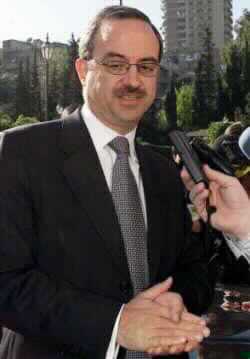- Author:
& News Agencies - Section:
WORLD HEADLINES
- Hajj & Umra WORLD HEADLINES
Arab League to press UN to appoint Arabs to its inpection teams in Iraq

Arab governments will press the United Nations to appoint Arabs to the teams of inspectors searching Iraq for weapons of mass destruction, Lebanon's foreign minister said Thursday. Mahmoud Hammoud said Lebanon and the Arab League have begun drawing up lists of possible inspectors to present to the United Nations.
"Not only do we hope and wish, we also will work so that (Arabs) will be among the inspectors," said Hammoud, who chaired a meeting of league foreign ministers convened to discuss the U.S.-Iraq dispute and the Arab-Israeli conflict.
Hammoud added Arab states were "watching closely" the work of the weapons inspectors, who returned to Iraq Monday for the first time in four years.
The league proposed two weeks ago that Arabs take part in the inspections so as to give the process more credibility with Iraq. In Baghdad, the son of Iraqi President Saddam Hussein , Odai, has called for the inclusion of Arab inspectors.
The chief U.N. weapons inspector, Hans Blix, has said the United Nations has trained six Jordanians and one Moroccan as inspectors. But it is not known if these Arabs will take part in the inspections, which are scheduled to begin Nov. 27.
Mohamed ElBaradei, who oversees the International Atomic Energy Agency which is searching for nuclear weapons in Iraq, is Egyptian.
Earlier Thursday, league Secretary-General Amr Moussa urged Arab governments to forge a joint policy to tackle what he called "an extremely deteriorating situation" in the Middle East.
Speaking only hours before a Palestinian suicide bomber killed 11 bus passengers in Jerusalem, Moussa said foreign ministers had "deep, very good and frank discussions on reactivating Arab action."
The ministers held informal talks Wednesday, capped by a five-hour session overnight, and met again Thursday after 90 minutes of talks with Syrian President Bashar Assad at his Damascus palace.
Owing to the importance of current events, the Damascus meeting was expanded from 10 to 13 of the league's 22 members. The ministers come from Egypt, Saudi Arabia, Jordan, Lebanon, Morocco, Bahrain, Yemen, Tunisia, Algeria, Oman, Libya, Syria and the Palestinian Authority .
Since the ministers met in Cairo earlier this month, Iraqi President Saddam Hussein has accepted a new U.N. disarmament resolution and international inspectors have arrived in Iraq to begin their search for banned weapons.
On the Palestinian-Israeli conflict, Arab peace efforts have centered on a proposal that offers Israel normal relations with Arab states in return for a withdrawal from all territory occupied in the 1967 Mideast War.
The United States is promoting a so-called "road map" for peace - drawn up by the United States, the United Nations, the European Union and Russia - which envisages the creation of a Palestinian state, at peace with Israel, in three stages.
PHOTO CAPTION
Jordanian Foreign Minister Mrwan al-Muasher speaks to reporters during a break in the Arab League committee meeting in Damascus, November 21, 2002. Arab foreign ministers from thirteen countries held talks on Thursday on the latest developments in the Middle East and Iraq. Speaking to reporters on Wednesday, al-Muasher said U.N. Security Council resolution that mandates weapons inspections in Iraq eased the immediate risk of war, but put the burden on Iraq to cooperate. REUTERS/Khaled al-Hariri
Related Articles
 Hajj virtues
Hajj virtues
-
School of Faith in Ten Days of Thul-Hijjah
The believing human self needs strong provocations in order to awaken whenever it is enveloped by laziness in...
-
The Status of Hajj in Islam
Hajj is the fifth pillar of Islam; Allah, The Exalted, ordained it in the ninth year after Hijrah (the Prophet's,...
-
School of Faith in Ten Days of Thul-Hijjah
The believing human self needs strong provocations in order to awaken whenever it is enveloped by laziness in relation...


 Home
Home Discover Islam
Discover Islam Quran Recitations
Quran Recitations Lectures
Lectures
 Fatwa
Fatwa Articles
Articles Fiqh
Fiqh E-Books
E-Books Boys & Girls
Boys & Girls  Hajj Rulings
Hajj Rulings Hajj Fatwas
Hajj Fatwas












